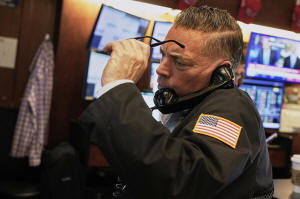Asian shares sink, with Japan's Nikkei down 5.6% as China-US trade war
escalates
[April 11, 2025] By
ELAINE KURTENBACH
BANGKOK (AP) — Asian shares sank Friday after U.S. stocks gave up much
of their historic gains from the day before.
The deepening worries over President Donald Trump’s trade war initially
helped pull Japan’s Nikkei 225 share index down 5.6%.
By mid-morning in Tokyo, it was down 4.2% at 33,148.45.
The yen surged against the U.S. dollar, which also lost value against
the euro.
One dollar bought 143.64 Japanese yen, down from about 146 yen a day
earlier. The euro rose to $1.1306 from $1.1195.
South Korea's Kospi fell 1.3% to 2,413.16, while in Australia, the S&P/ASX
200 shed 1.2% to 7,619.70.
In China markets, Hong Kong's Hang Seng edged down 0.4% to 20,606.04 and
Shanghai's lost 0.2% to 3,218.94.
Taiwan's Taiex gained 1.5% as investors expect more orders would
transfer to Taiwan under the worsening China-US trade war.
China announced more countermeasures against the United States and
losses for U.S. stocks accelerated after the White House clarified that
the United States will tax Chinese imports at 145%, not the 125% rate
that Trump had written about in his posting on Truth Social Wednesday,
once other previously announced tariffs were included. The drop for the
S&P 500 exceeded 6% at one point.
China, meanwhile, has been seeking to join forces with other countries
in apparent hopes of forming a united front against Trump. The world’s
second-largest economy is also ramping up its own countermeasures to
Trump’s tariffs.
Investors are viewing Trump's decision to delay higher tariffs for most
countries for 90 days as a ploy, not a pivot, Stephen Innes of SPI Asset
Management said in a commentary.
“That’s the market hitting the brakes, hard. The sugar high from Trump’s
tariff pause is fading fast, and Asia’s about to feel the comedown. The
champagne’s flat, the party’s over and the tape is twitching,” he wrote.
On Thursday, the S&P 500 tumbled 3.5% to 5,268.05, slicing into
Wednesday’s surge of 9.5% following Trump’s decision to pause many of
his tariffs worldwide. The Dow Jones Industrial Average dropped 2.5% to
39,593.66, and the Nasdaq composite tumbled 4.3% to 16,387.31.
“Trump blinks,” UBS strategist Bhanu Baweja wrote in a report about the
president’s decision on tariffs, “but the damage isn’t all undone.”
The stock price of Warner Bros. Discovery, the company behind “A
Minecraft Movie,” dropped 12.5% for one of Wall Street’s sharpest losses
after China said Thursday it will “appropriately reduce the number of
imported U.S. films.” The Walt Disney Co.’s stock sank 6.8%
[to top of second column] |

Trader Jonathan Mueller works on the floor of the New York Stock
Exchange, Thursday, April 10, 2025. (AP Photo/Richard Drew)
A spokesperson for the China Film
Administration said it is “inevitable” that Chinese audiences would
find American films less palatable given the “wrong move by the U.S.
to wantonly implement tariffs on China.”
That was after Trump and his Treasury secretary, Scott Bessent, sent
a clear message to other countries Wednesday after announcing their
pause on tariffs for most countries: “Do not retaliate, and you will
be rewarded.”
The European Union said Thursday it will put its trade retaliation
measures on hold for 90 days and leave room for a negotiated
solution.
Thursday’s swings also hit the bond market, which has historically
played the role of enforcer against politicians and economic
policies it deemed imprudent. It helped topple the United Kingdom’s
Liz Truss in 2022, for example, whose 49 days made her Britain’s
shortest-serving prime minister.
Earlier this week, big jumps for U.S. Treasury yields had rattled
the market, so much that Trump said Wednesday he had been watching
how investors were “getting a little queasy.”
Several reasons could have been behind the sharp, sudden rise in
yields. Hedge funds may have sold Treasurys in order to raise cash,
and investors outside the United States may be dumping their U.S.
government bonds because of the trade war. Regardless of the reasons
behind it, higher Treasury yields crank up pressure on the stock
market and push rates higher for mortgages and other loans for U.S.
households and businesses.
The 10-year Treasury yield had calmed following Trump’s U-turn on
tariffs, dropping all the way back to 4.30% shortly after the
release of a better-than-expected report on inflation Thursday
morning. That’s after it had shot up to nearly 4.50% Wednesday
morning from just 4.01% at the end of last week.
As Thursday progressed, though, the 10-year Treasury yield climbed
once again and reached 4.40%. It was trading at 4.39% early Friday.
In other dealings early Friday, U.S. benchmark crude oil lost 37
cents to $59.70 per barrel in electronic trading on the New York
Stock Exchange.
Brent crude, the international standard, fell 30 cents to $63.03 per
barrel.
___
AP Business Writer Stan Choe contributed.
All contents © copyright 2025 Associated Press. All rights reserved |